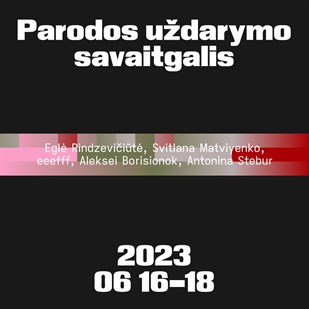We invite teenagers (16-18
years old), local to Vilnius and those who have moved or migrated
here from other cities and countries to participate in a series of
performance art workshops I AM HERE.
Find out more >
NGA
A workshop for 10-12-years old children by the Iranian artist Sevda Khatamian.
Find out more >
NGA
National Gallery of ArtSocial art will host workshop led by the group Stitchit on 22 April, 1:00 PM and 23 April, 1:00 PM.
The workshop #FramedinBelarus is intended for all who want to show solidarity with Belarusian political prisoners, who are interested in traditional embroidery, and who want to contribute to the social art project dedicated to political resistance.
Find out more >
NGA
Closing events programme for the exhibition "If Disrupted, it Becomes Tangible. Infrastructures and Solidarities beyond the post-Soviet Condition".
Find out more >
NGA,
Passing On Resilience is a two-day programme about acts of remembering over generations, and in places. Memories are not just made by personal experiences. They can be passed down across passages of time through epigenetics and culture, especially when they are linked to trauma.
Find out more >

>>> 17 June, 2023, 2-6 pm
Symposium: Infrastructures and Solidarities beyond the post-Soviet
Condition.
PROGRAMME
2-4 pm Nuclear Temporalities. Conversation
between Svitlana Matviyenko and Eglė Rindzevičiūtė.
During their live conversation, scholars Svitlana Matviyenko and
Eglė Rindzevičiūtė will delve into the political dimensions of
nuclear temporalities, examining the ways in which extractivist and
logistical infrastructures shape and intersect with social,
cultural, and environmental landscapes. They will explore the
broader implications of these infrastructures, considering their
impacts on communities, power dynamics, and the formation of
solidarity networks. Drawing on the artworks presented in the
exhibition, such as Oleksiy Radinsky's film 'Studies for
Chernobyl'22' or Nomeda and Gediminas Urbonas' installation
'Druzhba', the conversation will focus on the post-Soviet space and
the regions that have experienced Soviet nuclear policy in the
past, and Russian imperialist war, 'nuclear terror', and the
political uprisings that are taking place there today.
The conversation will start with the short statements by Svitlana
Matviyenko and Eglė Rindzevičiūtė, and will be followed by the
conversation moderated by the curators Aleksei Borisionok and
Antonina Stebur.
4:15-6 pm School of Algorithmic Solidarity: How to Steal the Diamond of Knowledge?. Workshop by eeefff. Registration needed: https://shorturl.at/pI167
The school of algorithmic solidarity is a series of collective
experiments and situated experiences that seek to answer the
questions: when the politics of the street intersects with the
politics of digital materiality? What are the effects of
algorithmization? Who and where could it feel? What are new forms
of commons that can emerge? at what public place the interfaces for
social interaction could be discussed? …[add your question]
Eeefff invites to join the next questionnaire - "how to steal the
diamond of knowledge?" on the politics of the public space,
possibilities to rehearse revolutionary
running-images-letters-imaginaries, scenarios of take over media
infrastructures.
>>> 18 June, 1 pm
Guided tour in English with curators Aleksei Borisionok and
Antonina Stebur. With entrance tickets (1 EUR). Registration
needed: https://shorturl.at/pI167
Participants:
Svitlana Matviyenko is Assistant Professor of Critical
Media Analysis in the School of Communication of Simon Fraser
University in Vancouver. Her research and teaching are focused on
information and cyberwar; media and environment; infrastructure
studies. She writes about the networking drive, user complicity,
and practices of resistance. She is a co-author of Cyberwar and
Revolution: Digital Subterfuge in Global Capitalism (Minnesota UP,
2019). Her publications include The Imaginary App (co-edited with
Paul D. Miller, MIT Press, 2014) as well as articles in (Re)Turn: A
Journal of Lacanian Studies, Harvard Journal of Ukrainian Studies,
Fibreculture Journal, Digital Creativity, and other
publications.
Eglė Rindzevičiūtė Associate Professor in Criminology and Sociology, the Department of Criminology and Sociology, Kingston University London, UK. Before coming to Kingston, she held academic positions at Sciences Po in Paris, France, and Gothenburg and Linköping universities in Sweden. She was a Visiting Scholar at the Department of History and Philosophy of Science at the University of Cambridge (2019). Dr Rindzevičiūtė is the author of The Power of Systems: How Policy Sciences Opened Up the Cold War World (Cornell University Press, 2016). Her next book in progress is entitled The Will to Predict: Orchestrating the Future. Dr Rindzevičiūtė is the Principal Investigator of two projects funded by the UK Arts and Humanities Research Council, "Nuclear Cultural Heritage: From Knowledge to Practice" (2018-2021) and "Nuclear Spaces: Communities, Locations and Materialities of Nuclear Cultural Heritage (NuSPACES)" (2021-2024), funded by a grant from the European Union Joint Programming Initiative for Cultural Heritage.
eeefff is the collective name of Nicolay Spesivtsev and Dzina Zhuk (also known by the alter-ego Bitchcoin), who are based in Minsk and Berlin and have been active since 2013. They are often seen in art exhibitions or lecturing at art colleges, but they do not strictly define themselves as artists. In fact, reading their statement, they might be best understood as a cybernetic political brigade, with the soul of a poet. They create digital works, modify code, erode interfaces and hack other people's websites; but they also affect the "real world" by calling for public actions, performative seminars and even open air picnics.
The event will be held in English and is free of charge.
The project is financed by Lithuanian Culture
Council
Partner European Humanities University
(EHU)
Sponsors: Goethe-Institut*, EU programme
'Creative Europe', Exterus, Fundermax, Hostinger
*The project is incorporated into a comprehensive package of
measures for which the Federal Foreign Office provides funding from
the 2022 Supplementary Budget to mitigate the effects of the
Russian war of aggression against Ukraine.


